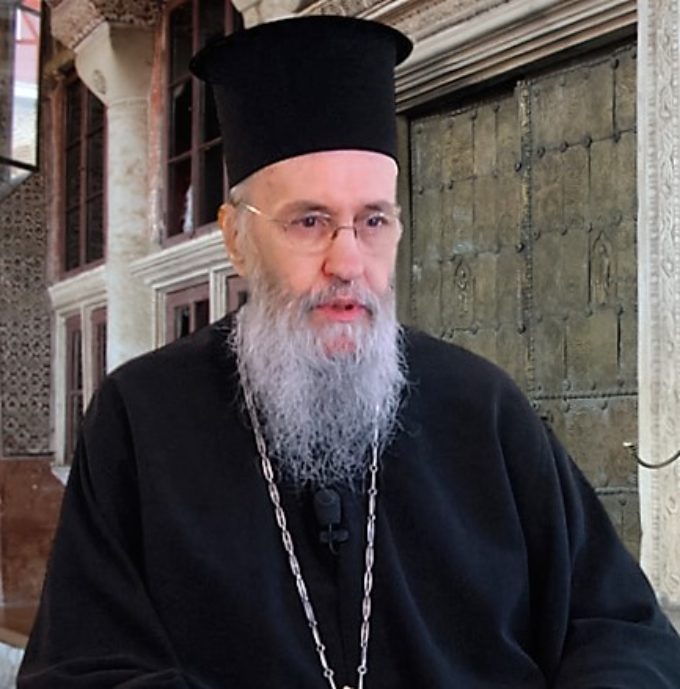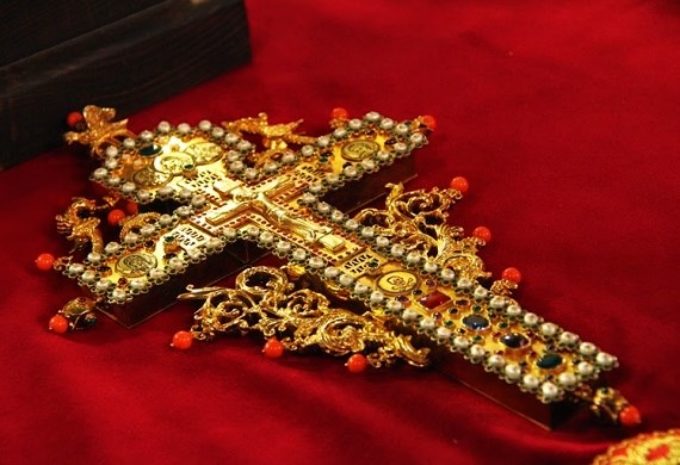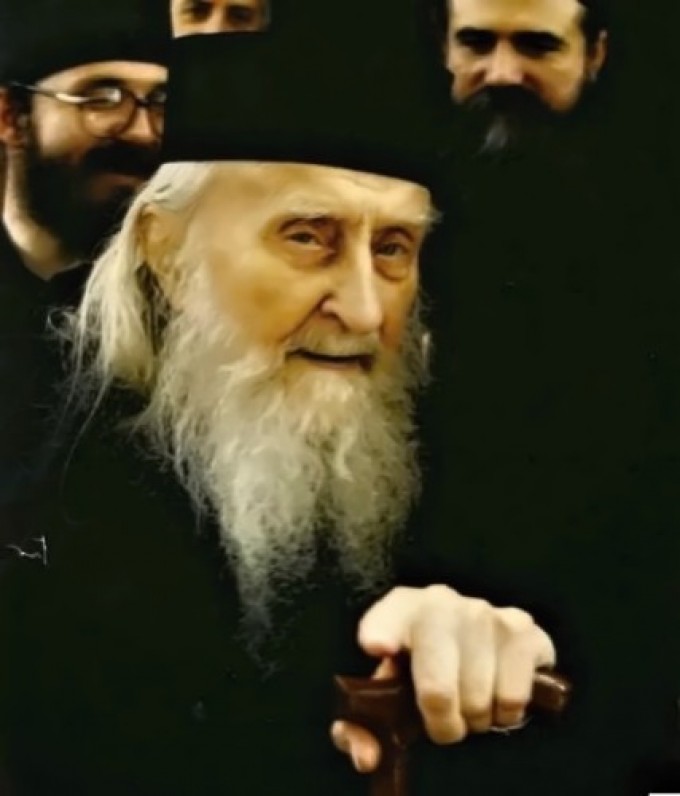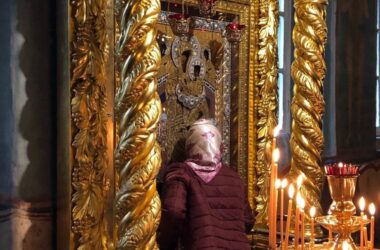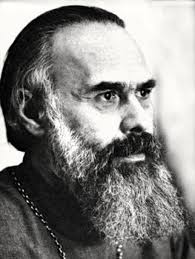The Metropolitan Ierotheos of Nafpaktos
Given the fact that there have been intense discussions lately regarding the Synod from Crete, we addressed the Metropolitan Ierotheos of Nafpaktos, one of the participants of this synod, who didn’t sign the controversial text “The relationship of the Orthodox Church with the rest of the Christian world”, for answering us at some questions referring at the turmoil aroused by this subject. We thank him for his kindness to grant us this interview, just as he always did, due to the long term relationship and collaboration between the journalists of our magazine and his Eminence.
The Holy Fathers say that a man for being a spiritual confessor at any time – therefore in our times as well – should have reached the level of spiritual enlightenment. Please tell us what is spiritual enlightenment and which are the signs that someone had reached it.
The testimony is closely connected with martyrdom. The Orthodox testimony without martyrdom, when there are no conditions for martyrdom, has value in itself, while the martyrdom without testimony has no value, since the heretics can suffer martyrdom too without confessing Orthodoxy and consequently, they are not martyrs from the Orthodox point of view.
The Orthodox testimony and martyrdom require a man who has reached spiritual enlightenment and has experienced the vision of God, right as you say in your question. Elder Sophrony from Essex said that martyrdom is a result of the vision of God. This thing is shown by the beatitudes of Christ, which starts with the deepest humility, passes through wailing, meekness, mercy, purity of heart, peace and in the end persecution.
This thing is seen in the life of the Apostles, who left everything for following Christ, they purified themselves, they experienced the pain of Christ’s cross, they saw Christ Risen, they received the Holy Spirit on Pentecost, they preached the Gospel of the Kingdom of God all over the world and they ended their lives by martyrdom, with the exception of John the Evangelist, who experienced the martyrdom of the Cross on Golgotha.
The confession of Christ implies the communion of the confessor with Christ in the Holy Spirit. Christ himself said: Whoever acknowledges Me before others, I will also acknowledge before My Father in heaven. And whoever disowns Me before others, I will disown before My Father in heaven. (Matthew 10, 32-33)
In this excerpt we must pay attention to the way things are expressed. Saint John the Chrysostom, explaining this, says that by this Christ shows that the confessor confesses not by his own power, but helped by divine grace . On the contrary, for the one who disowns Christ, He doesn’t use the same expression, because by becoming deprived of the gift of God, he disowns Christ.
This means that the confession of Christ is not made of human passions, but in communion with Christ: Christ gives the proof in his heart and the man confesses, according to the word of Apostle Paul: For it is with your heart that you believe and are justified, and it is with your mouth that you profess your faith and are saved. (Romans 10,10)
This means that the man can say I no longer live but Christ lives in me. (Galatians 2, 20), so that he learns righteously the word of truth. And for saying this he needs to have a deep conviction that Christ acts within him, in the Holy Spirit.
This means that within the human heart must be activated, in the Holy Spirit, the noetic energy of the soul – thing which the Holy Fathers define as mind (νοῦς) and there should be present the mental enlightenment, the mental prayer (the noetic prayer). Saint Maximus the Confessor wrote that when the man surpasses pleasure and pain, he reaches the purity of heart, when he surpasses forgetfulness and ignorance of God, then he reaches mental enlightenment and when he surpasses fancy, then he reaches deification and is a true theologian. Therefore when the man heals the passionate part of his soul, when the spiritual powers are released from the condition against nature and move towards the natural and supernatural condition, then he becomes father of the Church, Orthodox confessor, he has empirical Orthodox theology and can become martyr of Christ. Otherwise, the passions work and through them speaks the enemy of our faith.
“Orthodox theology is empirical.”
By this shall we understand that, for instance, someone who is well intentioned, loves Orthodoxy and wants to defend it zealously, but he didn’t reach enlightenment, in the moment he is put in the situation to confess he will disown faith, no matter how much he had wished to confess?
In the matters relating to the Orthodox faith it doesn’t count that much if someone is well intentioned or has a good spiritual disposition and zeal, because many of those who have such qualities are found in other religions or heresies as well. The problem is to have the Orthodox theological bases, theological studies and premises, hesychast tradition and many other things. Orthodox theology is empirical and this theology can distinguish what is created from what is uncreated, what is impure from what is pure, what is Orthodox from what is heretic, Orthodox confession from the delusory restiveness.
Today there is much confusion around these issues and this thing worries me. Someone may seem and act as an Orthodox but he is still possessed by demonic-luciferic insolence and promotes his own passions.
Think of all the heretics of the first centuries (Paul from Samosata, Arie and Nestorios etc), they were moral clerics, kind people, they had zeal, but on one hand, they didn’t have the knowledge of the empirical theology and on the other hand, they theologized from philosophy.
They spoke about the fact that God has essence and energy – but philosophically, Aristotelian, intellectually, therefore they fell into heresies. We clearly see this thing at the dynamic and modalist monarchianist theologians who tried, on the bases of some philosophical premises, to interpret that God is One and in the same time triune.
Contrariwise, the Church Fathers spoke about essence and energy from their experience in grace, in other words, they knew empirically that the man shares the uncreated energy of God and not His uncreated essence and this knowledge came from the fact that they saw the divine light which penetrated the depths of their existence, penetrated their hearts, but they couldn’t see the “spring” of this Light. On the base of this experience they said that the divine energy could be shared by man and the divine essence couldn’t be shared by him.
Who reaches such high spiritual levels becomes an Orthodox theologian, according to Apostle Paul: For God, who said, “Let light shine out of darkness,” made His light shine in our hearts to give us the light of the knowledge of God’s glory displayed in the face of Christ. (2 Corinthians 4:6) and gains divine love, which never fails (1 Corinthians, 13:8).
All worldly loves come and go, only divine love never falls. It is about that love which is connected with the experience of deification and ends in martyrdom.
The men who have a cerebral-rational theology – rather expressed by passions – and are driven by all kinds of interests, don’t have the fire of the divine love within themselves and they are fallible. Therefore it is not enough to theologize, but to have the Orthodox premises of the Orthodox theology, which are experience, hesychasm after Christ.
We see this thing at Saint Maximus the Confessor, who was an Orthodox hesychast, as evidenced in his first writings and then, till the end of his life, he came to be an Orthodox confessor, meaning that he connected hesychasm with confession.
We see the same at Saint Gregory Palamas, who lived an hesychast life and spoke theologically. This is the quintessence of the entire teaching and life of the Holy Fathers.
“Zeal it is not enough, spiritual experience is also required.”
In the history of the Church we read that there were cases like these you mention in your question. Meaning that there were Christians who had zeal for Christ, but when they faced difficult situations, they were afraid and disowned Christ – because they had zeal, “but not knowledgeably” (Romans 10:12) and they didn’t have a high spiritual experience. Zeal is not enough, especially the exterior one, fed by various passions, spiritual experience is also required together with the theological charism of discernment.
We have the example of Apostle Peter who disowned Christ during His suffering, whilst before he had said that “even if all fall away on account of you, I never will.” (Matthew 26:30-35). The reason for his fall was the fact that he differentiated himself from the other disciples, whom he disregarded and considered them able to disown Christ. But after his fall, when he disowned Christ, he humbled himself, he cried bitterly and after a profound repentance he remained in the group of the disciples whom he had disregarded and thus he became worthy to see Christ resurrected. And when he received the Holy Spirit on Pentecost, he became very powerful, preaching the Gospel of the Kingdom of God and suffering martyrdom for Christ. It is important for us to remain in the group of the disciples of Christ, in the Church, even if there are different problems – today as well as then, when the disciples left Christ – because we, remaining humbly in the group of the disciples, without disregarding them, we’ll be able to see the Risen Christ.
“We must have a holy spiritual father.”
How to prepare ourselves to become confessors or martyrs nowadays, by deed, not only by word?
We must live indeed within the Church, with repentance, prayer, by observing the commandments of Christ, by studying the words of the Prophets, Apostles and Holy Fathers, by partaking the body and blood of Christ. What we need the most is to have a holy spiritual father, with discernment, who can distinguish between the divine and demonic energies, between the created and uncreated energies, between the false and real energies, between the energies of the passionate man and those of the man freed of passions. The role of the spiritual father is to give birth again to people and make them children of God and not his own worshippers or followers of the devil. Because unfortunately it happens even this thing. The problem is that nowadays the holy spiritual fathers are extremely rare and the spiritual fathers dominated by passions, without any theological discernment, prevail. Such spiritual fathers cannot discern among heresy and truth, among what is divine and what is demonic, what is full of passion and what is free of passions and that is why it is intensely cultivated a theology that can be described as “theology of passions.”
When we cannot find a good spiritual father, then we should humble ourselves and ask for help from God, we should pray, remain settled in the teachings of the Prophets, Apostles and Holy Fathers, in the decisions of the Ecumenical Synods and God will reveal us his will.
“Intermingling theology with politics is a mistake.”
What is the right Orthodox attitude we should have after this Synod from Crete: of repentance for the helplessness of those who signed? Of revolt towards hierarchy? Should we redouble our prayers for reaching enlightenment?
This is an extensive subject and cannot be comprised in a brief answer. I shall highlight some aspects.
For the beginning, the texts adopted by the Synod from Crete, especially that one entitled “The relationships of the Orthodox Church with the rest of the Christian world” is not a pure theological text, but more likely a diplomatic one. The problem is that someone could extract from this text certain sentences and could sustain conflicting arguments, from the extremely liberal edge to the extremely conservative one. I read all sorts of conflicting opinions, using different phrases from the text and this shows its problematic aspects.
The above mentioned text discontents both the Orthodox and the other Christians. Because, as you well know, the Pope considers that he represents the One and only Holy Catholic and Apostolic Church and cannot admit the fact that he leads a heterodox Church.
The history of the church showed us that every time when in theological matters are interfered politics and diplomacy in the end are not achieved the aims of this way of thinking.
Remember that the political power in the Christian Roman Empire used Monenergism for covering the gap between the Orthodox and the monophysites, the way it did with the Monothelitism too. This approach started from the political power (through “Ekthesis” and “Typos”) , apparently for the peace of the Empire, but it failed every time. It happened the same with the pseudo synod from Ferrara-Florence, where they tried to unite the East with the West by means of political and diplomatic reasons, fact that was condemned by history. I think it’s a mistake to intermingle theology with politics and especially with the geopolitics of today.
“Schismatic groups become in time heretical.”
Remember also that whenever hasty actions occurred in the life of the Church because of zealot Christians, who, maybe out of their good intentions, interrupted the communion with the ecclesiastical leadership from that period, when the Church, by its Ecumenical Synods, regulated the issues and settled the dogmatic terms for the dogmatic subjects, the schismatic groups remained schismatic and became heretical, because a superficial movement over time consolidates itself, having unpredictable ecclesiastical consequences.
This thing may be seen especially in the East, as I found during my long stay in Syria and Lebanon. In other words, there are very active Christian groups, like the monophysites, the Monothelites etc. that do not accept the dogma of the IVth Ecumenical Synod from Chalcedon, nor those of the following Ecumenical Synods (the Vth and the VIth). As a result, a break starts from an insignificant, but maybe justified reason and many times it ends up in heresy, fanaticism and strange theological reasons.
It is apparent that the respective text, which refers at the Orthodox Church and the rest of the Christian world was not ready for a final decision, having many conflicting points and for this reason it must be rectified. This thing was sustained by certain churches, among them being yours as well (The Romanian Orthodox Church) This means we have to strive so that the text would be rectified and rewritten in a theological and patristic manner.
In this respect it is significant the example of the so-called Confession of Chiril Lucaris (the confession presented as being written by the Patriarch Chiril Lucaris of Constantinople, but most probably drafted by the Calvinists and only signed by the Patriarch), which was influenced in many ways by the Calvinism, although it was presented as an “Orthodox confession of the Christian Faith.”
There was an extensive talk upon this subject, but the Christians, after the release of this heretical confession, didn’t leave the Church, but fought to be cancelled, as it happened in the Synods from 1638, 1642, 1672, 1691, which have an universal authority.
“The Church is sanctified by Christ, not by us.”
Therefore I consider that calmness, temperance, prayer are needed in order to prevent the occurrence of schisms within the Church. According to Saint John the Chrysostom, who causes these schisms has no chance to be saved, not even by martyric blood.
The Church is a living body, is the Body of Christ and the communion of deification and it will regulate itself this matter in time.
With the divine-human body of the Church it happens the same as with the human body which keeps only the nutrients it needs and eliminates the harmful substances.
We, of course with due respect towards the hierarchy of the Church, with humility and religious conscience, have the duty to come with serious and reasoned theological standpoints, which to reject the wrong opinions and Christ, who is the Head of the Church, will preserve His Body clean. Besides this, the Church is sanctified by its Head, by Christ and not by us. We are not the saviors of the Church, as long as Savior of the Church is Christ Who was crucified for it, but humble members of the Church, who remain within it so that we would be saved.
Thus, we need to have temperance, enlightened mind, theological discernment, religious conscience, spiritual life and to live in an atmosphere of prayer.
I think that in the following period of time the four Churches which were not present in Crete will express their own point of view, the Holy Mountain will make a decision in this respect, with the spiritual experience of the elders, all the Churches will reflect upon this matter with much more maturity, the issues will be discussed within monasteries, faculties of theology, in synaxes of the clergy and laity and the subject will be clarified.
It is required a lot of care so that we won’t find ourselves out of the Church exactly when the Church would have corrected the theological mistakes of some of its members!
Article written by Anca Stanciu
The interview is published in the magazine “Familia ortodoxa” no.9 (92)/2016
Source: familiaortodoxa.ro

